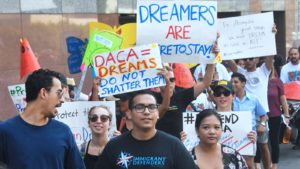By Nina Kegelman || Contributing Writer

Sometime before my first year here at Franklin & Marshall began, I saw this picture floating around Facebook depicting the traveling dynamic of wolf packs. The image was of a pack trotting through snow in succession, segregated by clusters of wolves with designated roles. A caption below described in detail the duties of each cluster and their place in the line, supposedly forming a specific system in which the weakest members of the group, the sick and lame wolves, were protected from the inside by the rest. One wolf trailed behind on its own a bit further back. “The alpha,” who decides the course of action, watches over the pack as they push forward.
Why it is that wolves seem to have a better method of self-organization for the good of the whole than we humans impose in most situations, I don’t know. And now more than ever in our country, there appears to be a more obvious lack of authentic, idealistic leadership aimed at protecting the needs of all individuals in our community, even the ones thought to slow us down.
Recently, the most obvious example of this negligence is the statement released by Attorney General Jeff Sessions announcing that the Trump administration will be making efforts to rescind the Deferred Action for Childhood Arrivals (DACA) program.
This program, though somewhat controversial for its effectiveness in providing safe, common-sense opportunities for children brought to the United States by their parents illegally, is one of the most prominent attempts made at the federal level to offer some form of amnesty or path to citizenship for immigrant children, whose presence in this countries was not entirely of their own free will. Through DACA, kids can stay in the United States protected from deportation so long as they act as responsible members of our society, through a clean record and either education or military service.
Regarding education specifically, the Trump administration has undermined the importance of strong, honest leadership most pointedly through the vehemently disputed appointment of the unqualified Betsy DeVos as Secretary of Education and the choice of fraudulent Julian Schmoke Jr. to lead the Student Aid Enforcement Unit. From issues of Title IX rollbacks to Trump’s mediocre reaction to a violent Neo-Nazi rally on a college campus, failures from our leaders to support academic institutions have been disheartening.
The issue of opportunity and privilege comes to mind at this time, as it did during my convocation ceremony. Standing beside my new friends and classmates in our silly black robes, I smiled a smile of relief and gratitude when I noticed that President Porterfield was the last of the faculty and administration to process into the assembly.
With every speech given, I found myself profoundly impressed with the breadth and depth of knowledge and guidance offered to my class and me. A professor of mathematics eloquently interpreted Robert Frost’s poem “The Road Not Taken,” reminding me of a term I knew from calculus: divergence.
That poem finally resonated with me, as I sat there thinking about how so many of the choices made in my life and the lives before mine led to the moment in which I sat at convocation, astounded by the gathering of great intellectuals and accomplished peers surrounding me. I come from a family about as middle class as middle class can get, and I’d already met classmates coming as first generation college-goers as well as ones with distinguished family trees of doctors and professionals. It was easy to feel like my relatively privileged but unspectacular upbringing meant convocation should be just another orientation activity to be crossed off the list.
But then I thought of how my dad, a high school math teacher, could say he taught, and encouraged, someone who later became the first transgender person to speak at any national convention. That person is Sarah McBride, and her story is one of great triumph over adversity. But education, and even my non-PhD-possessing father, was an important part of it.
Yes, we each have the ability to impact our communities for the better, if even in seemingly insignificant ways. It certainly helps to have a reminder of this ability, but our very presence at an institution that stands for the values of reasoned debate and discussion, multicultural friendship, and pursuit of the truth should be more than enough. In times like this, when administrations make choices based on the interests of the unobstructed and the untroubled elites of our society, it is necessary to look back at the wolf-pack and ask, “Where would I stand?”
First year Nina Kegelman is a contributing writer. Her email is nkegelma@fandm.edu.